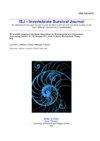Lethal and sub-lethal effects of cypermethrin and glyphosate on the freshwater's copepod, Acanthocyclops robustus.
IF 1.2
4区 农林科学
Q4 IMMUNOLOGY
引用次数: 5
Abstract
The study aims to evaluate the acute and chronic toxicity of cypermethrin and glyphosate to a freshwater’s copepod, Arcanthocyclops robustus. The acute sensibility was assessed by estimating lethal concentrations. Then the chronic exposure allowed to assess the effects of low concentrations (0.2489 ppb and 0.4978 ppb respectively 10 % and 20 % of LC50 at 48 h of cypermethrin and 1.3 ppm and 2.6 ppm respectively for glyphosate) on the species. The estimated lethal concentrations at 1%, 50 % and 99 % were 2.353 ppb, 4.755 ppb and 9.610 ppb in 24 h, respectively 0.567 ppb, 2.489 ppb and 10.929 ppb in 48 h for cypermethrin. Regarding glyphosate, the lethal concentrations 1 %, 50 % and 99% were 5 ppm, 19 ppm and 73 ppm in 24 h, respectively 8 ppm, 13 ppm and 21 ppm in 48-h. hatching was affected by 20 % LC50 of cypermethrin; only 20 % of females have hatched their eggs against 60 % in the control treatment. Females and nauplii survival was affected by both pesticides. A. robustus is then more sensitive to cypermethrin compared to glyphosate. Low concentration like 0.4978 ppb of cypermethrin could affect it population and then all the ecosystem biodiversity.氯氰菊酯和草甘膦对淡水桡足动物粗棘足虫的致死和亚致死效应。
本研究旨在评价氯氰菊酯和草甘膦对一种淡水桡足动物的急性和慢性毒性。通过估计致死浓度来评估急性敏感性。然后,慢性暴露可以评估低浓度(分别为0.2489 ppb和0.4978 ppb的10%和20%的LC50在48小时,草甘膦分别为1.3 ppm和2.6 ppm)对该物种的影响。在1%、50%和99%条件下,氯氰菊酯24 h的致死浓度分别为2.353 ppb、4.755 ppb和9.610 ppb, 48 h的致死浓度分别为0.567 ppb、2.489 ppb和10.929 ppb。草甘膦的1%、50%和99%致死浓度分别为5 ppm、19 ppm和73 ppm, 48 h致死浓度分别为8 ppm、13 ppm和21 ppm。20% LC50氯氰菊酯对孵化有影响;只有20%的雌鸟孵出了蛋,而对照组的雌鸟孵出了60%的蛋。两种农药对雌蜂和幼体的成活率均有影响。与草甘膦相比,雄蜂对氯氰菊酯更敏感。低浓度如0.4978 ppb的氯氰菊酯可以影响其种群,进而影响整个生态系统的生物多样性。
本文章由计算机程序翻译,如有差异,请以英文原文为准。
求助全文
约1分钟内获得全文
求助全文
来源期刊

ISJ-Invertebrate Survival Journal
IMMUNOLOGY-ZOOLOGY
CiteScore
2.10
自引率
0.00%
发文量
0
审稿时长
>12 weeks
期刊介绍:
Invertebrate Survival Journal (ISJ) is an international and open access journal devoted to prompt and innovative studies on the basic defense mechanisms in invertebrates, in particular with a view to identifying biotechnologies able to act against derived diseases and related economic damage.
Contributions will be mainly in the form of Letters to the Editor, Visions and Perspectives, Short Communications, Technical Reports, Research Reports, Review, Minireview and Reports of Meetings. Letters to the Editor can be commentaries or perspectives on invertebrate defence mechanisms or replies to the data published in ISJ.
 求助内容:
求助内容: 应助结果提醒方式:
应助结果提醒方式:


